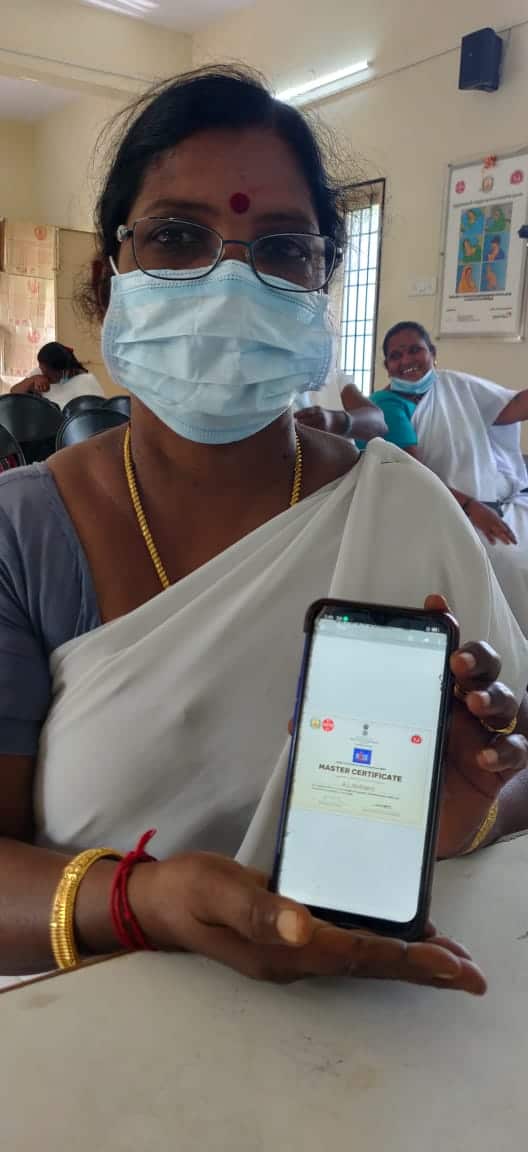Meeting Health Worker Training Needs in India
February 17th, 2021 | viewpoint
In 2016, 12.9 million infants worldwide were not vaccinated. In India, over the past 5–7 years, the Universal Immunization Programme (UIP) has undergone tremendous reforms to improve coverage, equity, and quality while expanding the disease spectrum covered by new vaccines.
The Government of India will continue to improve the immunization program in the coming years with more vaccines in the pipeline and new tools, techniques, and methodologies. These innovations and changes require upgrading frontline health workers’ knowledge and skills.
Typically, health workers are trained using a standard cascade-based model that reaches learners only once every 3 to 4 years, if that frequently. Moreover, a single exposure to new guidelines during instructor-led trainings is rarely sufficient to bring about the desired change in the knowledge and skills of the health workers.
The Indian Government is supplementing its efforts to build health worker capacity with support from partner organizations. As a partner, we are implementing the Rapid Immunization Skill Enhancement (RISE) project under the stewardship of the Ministry of Health and Family Welfare, Government of India, and with funding from Gavi, the global vaccine initiative. The objective of RISE is to develop an interactive, continuous, and adaptable knowledge and skill-building package for health care personnel working in UIP to complement existing training programs.
At the beginning of the RISE project in 2018, we conducted a training needs assessment to understand the capacity-building challenges at various levels of the UIP. Key findings included a need for training medical officers and auxiliary nurse-midwives (ANMs) on technical topics; lack of understanding of the importance of record keeping; and that ANMs did not properly provide four key messages or information related to adverse effect following immunization (AEFI) to parents and relied on other support staff.
 The assessment also explored the digital literacy of health workers and showed that 82 percent of ANMs and village health nurses (VHNs), among other health workers, had a smartphone.
The assessment also explored the digital literacy of health workers and showed that 82 percent of ANMs and village health nurses (VHNs), among other health workers, had a smartphone.
With these data in hand, the RISE project team, working under the guidance of government counterparts, recognized an opportunity to make ongoing learning available to health workers on their smartphones, when and where they had the need and time to learn.
To organize this new process and platform for learning, the RISE team worked with a local software company to develop the learning management system (LMS) to create, distribute, and manage the delivery of user-directed training content.
The LMS makes it easy to create courses and make changes, provides learning experiences that are adapted to individual learners, and gives administrators and learners the opportunity for online collaboration. The LMS can also be scaled-up easily, adding new learners and new courses as required. The system also allows learners and supervisors to monitor learner progress and performance through built-in analytics, helping supervisors pinpoint learners who may need more support.
“I used the dashboard to see which VHNs needed specific topic support by comparing the pre- and post-test percentages. With the ability to see their answers, I can identify exactly in which area the health worker needs more training and handholding,” said Tmt. Saroja, sector health nurse, Nandivaram, Chengalpattu, Tamil Nadu.
The RISE platform has added a different dimension to capacity building in India by facilitating a learner-centric training approach. Learners are empowered to access and gain knowledge on their own, at their convenience, without the direct involvement of trainers. They are in-charge of their own progress with little follow-up from supervisors.
Adults learn best when they have control over their learning and can apply it on the job to solve a problem. By accessing information and learning through the LMS, RISE learners are motivated to continue their learning, and feel proud when they have completed each module. As an additional motivation, learners automatically receive certificates for completing the modules and can compare their progress among their peers. The content storyline format engages the learner through practical and familiar scenes that help her or him remember and apply the concepts.
With Gavi support, this new learning platform is creating a cadre of health workers who have information and learning modules literally at their fingertips night and day. With new vaccines are on the horizon, health worker learning will become more critical than ever. RISE is poised to meet that need in India.
Written by Dr. Parthasarathi Ganguly, Project Director; Vijay Aggarwal, State Training Coordinator; Dr. Rachna William. State Training Officer; Jaykumar Jha, Project Manager Applied Technology
Learn more about our content development strategy for this capacity-building work here.
We strive to build lasting relationships to produce better health outcomes for all.